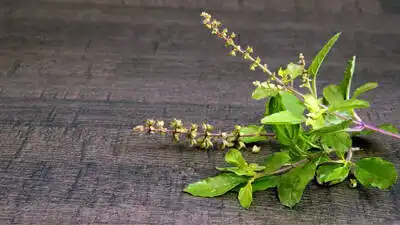In today’s world, more and more people are turning to natural remedies to boost immunity and fight everyday illnesses. And among these, Ayurvedic Panch Tulsi has gained immense popularity, and for good reason. But have you ever wondered why many experts and mainstream professionals don’t talk about it?
Some say it is because Panch Tulsi became a part of Ayurveda, others say that it is not talked about because it is naturally available, and some experts don’t believe in natural solutions to problems, and this debate just goes on.
But here we mention a few benefits of Panch Tulsi, what it is, where it is used, and the likes.
What is Panch Tulsi?
‘Panch’ means five, and Panch Tulsi is a combination of five different types of Tulsi, the Holy Basil plant.
People usually use Rama Tulsi, Shyama Tulsi, Van Tulsi, Kapoor Tulsi, and some more varieties to the blend, and a combination of 5 Tulsi types gives strong antimicrobial properties. And each of them have their own unique healing properties, and when combined, they offer a powerful natural formula for detoxifying the body, improving immunity, and supporting respiratory health.
Why do some experts not recommend it?
There are so many experts and practitioners who believe that anything pharmaceutical and Western is better than Ayurvedic and naturally occurring treatments, and thus most Indians do not know about the benefits of Panch Tulsi.
Plus, there have been limited studies and trials on these natural herbs, and thus they are not as actively endorsed by people.
How some products help
Patanjali Ayurved’s ‘Tulsi Panchang Juice’, an Ayurvedic formulation made from Tulsi mentioned above has the following information on its website, “Tulsi Panchang juice is a proprietary ayurvedic medicine, crafted from the goodness of Tulsi (Ocimum sanctum). Known for its powerful medicinal properties, this herbal juice supports overall well-being by boosting immunity and managing infections. It is beneficial for respiratory health, heart function, skin vitality, oral hygiene, and digestive balance. Additionally, it helps reduce stress, making it a holistic solution for maintaining a healthy lifestyle.”
The research and studies around Tulsi
According to a research titled ‘Tulsi – Ocimum sanctum: A herb for all reasons’ by Marc Maurice Cohen, published in the National Library of Medicine, “Of all the herbs used within Ayurveda, tulsi (Ocimum sanctum Linn) is preeminent, and scientific research is now confirming its beneficial effects. There is mounting evidence that tulsi can address physical, chemical, metabolic and psychological stress through a unique combination of pharmacological actions. Tulsi has been found to protect organs and tissues against chemical stress from industrial pollutants and heavy metals, and physical stress from prolonged physical exertion, ischemia, physical restraint and exposure to cold and excessive noise. Tulsi has also been shown to counter metabolic stress through normalization of blood glucose, blood pressure and lipid levels, and psychological stress through positive effects on memory and cognitive function and through its anxiolytic and anti-depressant properties. Tulsi’s broad-spectrum antimicrobial activity, which includes activity against a range of human and animal pathogens, suggests it can be used as a hand sanitizer, mouthwash and water purifier as well as in wound healing, the preservation of food stuffs and herbal raw materials and traveler’s health.”
